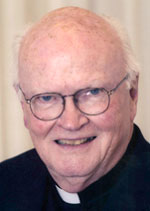When Holy Cross Father Theodore M. Hesburgh turned 91, Stephen Joel Trachtenberg, president emeritus of George Washington University, greeted him by saying, “Father Ted, I hope you’re going to live forever!” Father Hesburgh, the president emeritus of Notre Dame replied, “Steve, I already have!”
Well, not quite; Father Hesburgh died Feb. 26 at age 97.
A Wall Street Journal interviewer once asked him, “You’ve known a lot of leaders. What qualities do the best ones possess?” Father Hesburgh said, “First they have to have intelligence, because leadership has to do with ideas, to be able to see the problems and see solutions to problems. … Then the kind of dedication to not just live your own narrow little life with its narrow interests, but to be willing to contribute something to the commonweal.”
I remember well the first time I met him. It was in St. Louis in early 1974 at the Chase Park Plaza Hotel at a meeting of what was then known as the higher education department of the National Catholic Educational Association.
[hotblock]
I was dean of arts and sciences at Loyola University of New Orleans and had just published an article in The Chronicle of Higher Education. Father Hesburgh read the article that day and went out of his way to seek me out and offer a word of appreciation. That pleased me, of course, and also taught me a valuable lesson: never hesitate to offer subordinates and relative unknowns a word of encouragement — not flattery, just genuine appreciation.
Another lesson I learned from Father Hesburgh was given in a hotel auditorium full of university presidents in New Orleans in 1976 at a meeting of the American Council on Education. Father Hesburgh, by then had served more than 20 years as president at the University of Notre Dame and spoke as something of an “elder statesman.”
He had an attentive and admiring audience of higher education leaders. I was more than usually interested because I was then in my first year as president at the University of Scranton. What I remember most from that talk are the closing words.
Father Hesburgh said to his presidential colleagues:
“I would like to close on a very personal note which I trust you will indulge me. Over the years, I have stood at the graveside of many of my university colleagues and have contemplated the quiet nobility of their lives, so totally and unselfishly given to the higher education of young men and women. Someday, some of my lifelong associates will stand at my graveside. At that time, I would feel greatly honored if they will say, ‘Well, we worked together for a long time. We didn’t always agree, but that never bothered our friendship or our forward march. At least, he was fair and tried to make the place better. Now he can rest in peace.'”
He continued: “I’m not anxious for that day to come soon, but when it does, I would settle for those final sentiments. Who among us would ask for more? The respect of our colleagues is quite enough, assuming God’s blessing, too. We won’t get the one without the other.”
Happily, Father Hesburgh, who was then 59, had many more years to go.
When he is laid to rest in Holy Cross Cemetery on the grounds of his beloved Notre Dame, thousands of campus colleagues and fellow laborers from the groves of academe will be on hand to offer a prayer of thanks and heart-felt praise for a great priest and educational leader who never failed to sign his letters, “Devotedly in Notre Dame.”
That devotion defined his life.
***
Father Byron served as the president of the University of Scranton from 1975 to 1982 and The Catholic University of America from 1982 to 1992.
PREVIOUS: Sacrament, not psychoanalysis
NEXT: Truth under fire: What is a lie, and what is a mistake?



I am amazed that there is someone praising this Priest. He was single- handedly responsible for the secularization of Notre Dame. Time to wake up!